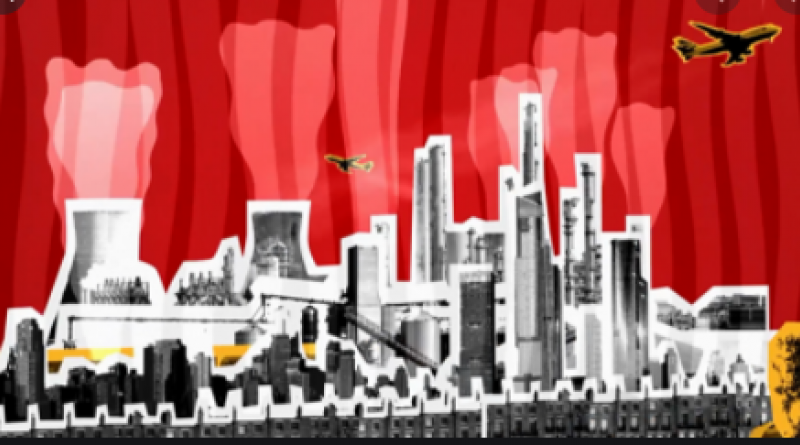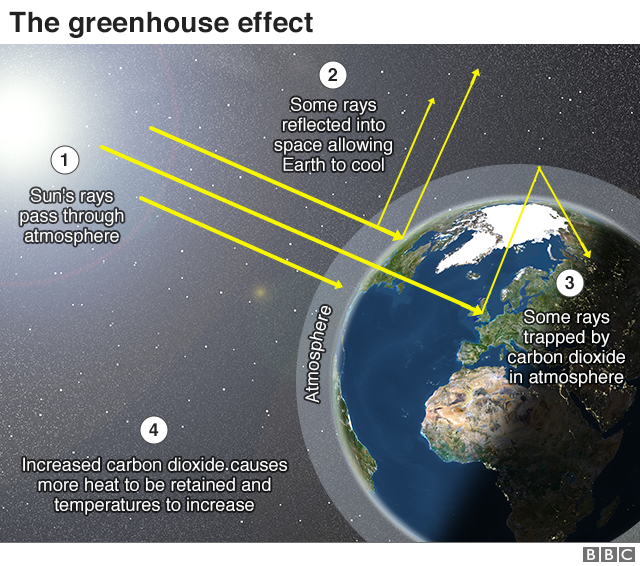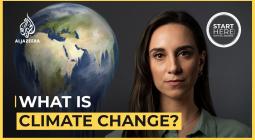What is climate change? A really simple guide.

While Covid-19 has shaken much of human society, the threat posed by global warming has not gone away.
Human activities have increased carbon dioxide emissions, driving up temperatures. Extreme weather and melting polar ice are among the possible effects.
What is climate change?
The Earth's average temperature is about 15C but has been much higher and lower in the past.
There are natural fluctuations in the climate but scientists say temperatures are now rising faster than at many other times.


Other greenhouse gases such as methane and nitrous oxide are also released through human activities but they are less abundant than carbon dioxide.
What is the evidence for warming?
The world is about one degree Celsius warmer than before widespread industrialisation, according to the World Meteorological Organization (WMO).
It says the past five years, 2015–2019, were the warmest on record.
Across the globe, the average sea level increased by 3.6mm per year between 2005 and 2015.
Most of this change was because water increases in volume as it heats up.

However, melting ice is now thought to be the main reason for rising sea levels. Most glaciers in temperate regions of the world are retreating.
And satellite records show a dramatic decline in Arctic sea-ice since 1979. The Greenland Ice Sheet has experienced record melting in recent years.Satellite data also shows the West Antarctic Ice Sheet is losing mass. A recent study indicated East Antarctica may also have started to lose mass.
The effects of a changing climate can also be seen in vegetation and land animals. These include earlier flowering and fruiting times for plants and changes in the territories of animals.
How much will temperatures rise in future?
The change in the global surface temperature between 1850 and the end of the 21st Century is likely to exceed 1.5C, most simulations suggest.
The WMO says that if the current warming trend continues, temperatures could rise 3-5C by the end of this century.
Temperature rises of 2C had long been regarded as the gateway to dangerous warming. More recently, scientists and policymakers have argued that limiting temperature rises to 1.5C is safer.
An Intergovernmental Panel on Climate Change (IPCC) report in 2018 suggested that keeping to the 1.5C target would require "rapid, far-reaching and unprecedented changes in all aspects of society".
The UN is leading a political effort to stabilise greenhouse-gas emissions. China emits more CO2 than any other country. It is followed by the US and the European Union member states, although emissions per person are much greater there.
But even if we now cut greenhouse-gas emissions dramatically, scientists say the effects will continue. Large bodies of water and ice can take hundreds of years to respond to changes in temperature. And it takes CO2 decades to be removed from the atmosphere.
How will climate change affect us?
There is uncertainty about how great the impact of a changing climate will be.
It could cause fresh water shortages, dramatically alter our ability to produce food, and increase the number of deaths from floods, storms and heatwaves. This is because climate change is expected to increase the frequency of extreme weather events - though linking any single event to global warming is complicated.
As the world warms, more water evaporates, leading to more moisture in the air. This means many areas will experience more intense rainfall - and in some places snowfall. But the risk of drought in inland areas during hot summers will increase. More flooding is expected from storms and rising sea levels. But there are likely to be very strong regional variations in these patterns.
Poorer countries, which are least equipped to deal with rapid change, could suffer the most.
Plant and animal extinctions are predicted as habitats change faster than species can adapt. And the World Health Organization (WHO) has warned that the health of millions could be threatened by increases in malaria, water-borne disease and malnutrition.
As more CO2 is released into the atmosphere, uptake of the gas by the oceans increases, causing the water to become more acidic. This could pose major problems for coral reefs.
Global warming will cause further changes that are likely to create further heating. This includes the release of large quantities of methane as permafrost - frozen soil found mainly at high latitudes - melts.
Responding to climate change will be one of the biggest challenges we face this century.
BBC




